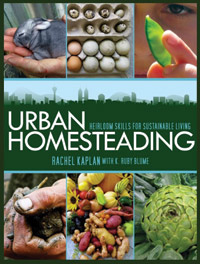Urban Homesteading
Heirloom Skills for Sustainable Living
The premise of Urban Homesteading, a recent book coauthored by Rachel Kaplan and K. Ruby Blume, is simple: Everyone, everywhere, can contribute to their own food safety and nutrition by growing and preserving their personal or cooperative community harvests. Small and large garden spaces can be successful sites for reclaiming the source of people’s provisions.
This knowledge has only recently been lost in the migration from farmland to city that many have experienced. Reclaiming this universal wisdom requires only a willingness to simply go outside and dig in the dirt — even if it is only one or two containers of potting soil. Lucky are those who have a suburban lot or even a more rural piece of land, but the inner city dweller can benefit equally from free access to sunlight and air that plants require to produce healthful and delicious food.

Urban dwellers are responding to this call to arms and have begun to turn their homes into mini-farms complete with chickens, rabbits, and goats. The result of their efforts can create havens of abundance that save water and energy as well as reduce waste. These urban landscapes serve to bolster local economies and revitalize communities, while engendering a healthier lifestyle and diet.
Both Kaplan, with a background in farming, and Blume, who has a passion for self-reliance and urban sustainability through low-cost adult education, have pushed their own limits. In this book, they hope to inspire the same drive in many others. The book is broken into five sections addressing everything from how to better manage water, waste, and energy to resources for taking care of yourself while taking care of the world. The first place to start is laid out in the beginning chapter, “Start Where You Are,” with advice on the growing grassroots culture of urban homesteaders across the country.



